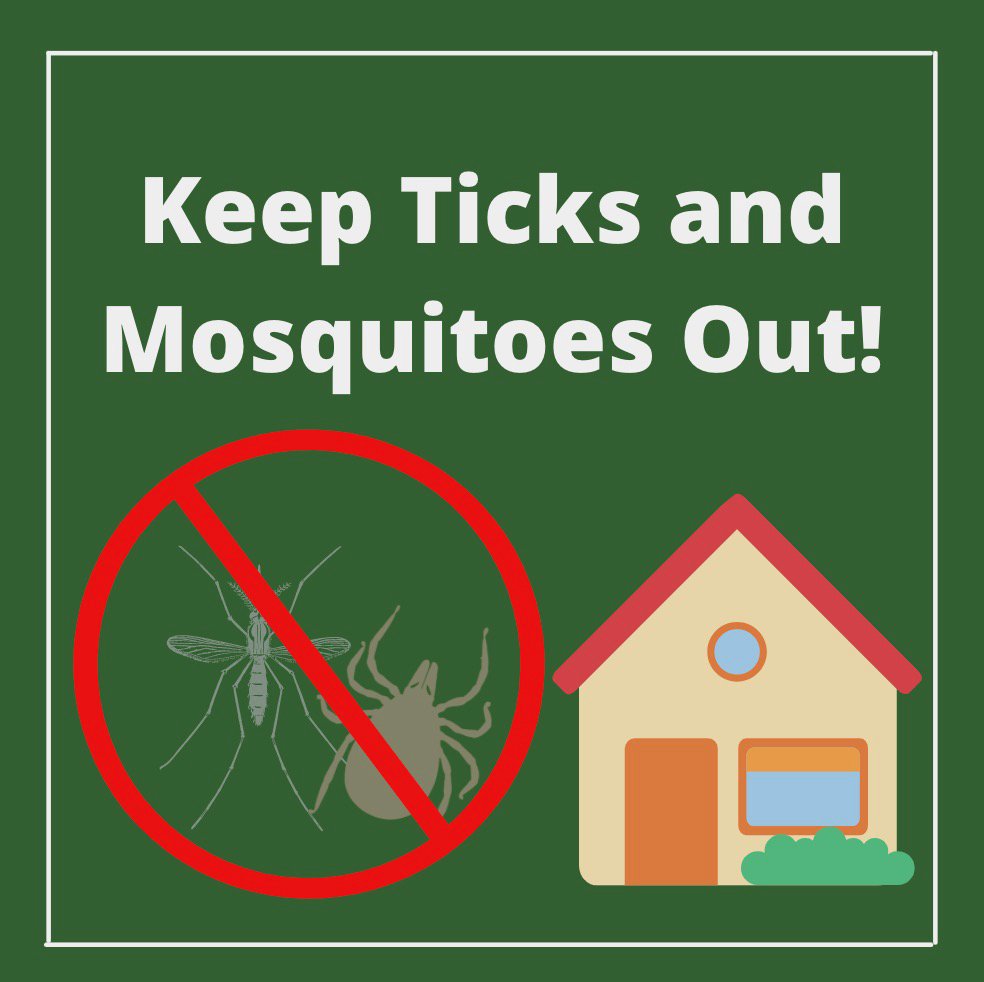Mosquitos and Ticks
What is the Problem?
Spring has sprung and that means mosquito and tick season is upon us! There are approximately 150 species in the U.S. of which a small fraction transmit diseases such as West Nile and EEE. Ticks bring risks of Lyme Disease, the deer tick being the most common vector. Ticks do not eat vegetation and spend most of their lives in sheltered areas where pesticides are unable to reach. Conventional pesticides for mosquitoes and ticks are often ineffective, creating risks for people and the environment. So even if these pests are a complete nuisance, we must still consider eco-friendly and people-friendly methods of control.
Sources: https://www.beyondpesticides.org/resources/managesafe/choose-a-pest
What Can You Do?
There is no way to completely eliminate mosquitoes and ticks from an outdoor area, but there are certainly safe practices that can help keep them away from you and your yard.
Remove sources of standing water/moisture: tires, gutters, drains, toys, tarps, dripping faucets. Change water in bird baths every few days.
Trim overgrown vegetation, clean around bushes and under trees.
Use mesh screens on windows and door.
Burn citronella candles.
Do not let your pet go into tick infested areas and/or use safe pet collars/medications.
Stay indoors during dawn and dusk.
Wear loose, light-colored clothing that covers your body, especially the legs. Tuck pants into socks and wear a hat.
Be sure to always monitor any abnormal bug bites and conduct tick checks! Throw clothing into the dryer for 30 minutes on high heat to kill ticks.
How to Get Started
If you have a pond, fill it with mosquito eating fish such as minnows and bluegills. These fish eat mosquito larvae, and do not require any special sand or substance- they are self-sustaining and self feeding! Keep these other natural mosquito predators around: birds, dragonflies, beetles, frogs, snails, bats.
BTI (bacillus thuringiensis, strain israelensis), “Mosquito Dunks”/”Mosquito Bits” are used specifically to kill mosquito larvae when placed on standing water. It is a bacterial strain that is eaten by mosquito larvae and kills them. It is safe to use wherever water collects: birdbaths, ponds, gutters, unused swimming pools.
Both mosquitoes and ticks can be repelled by using products containing Oil of Lemon Eucalyptus which is a natural and effective product (brand name: REPEL). It is DEET-free, so it is safe for children over three and will not pose any threat for health problems. (Do not use the oil by itself, only as part of Repel or a similar product.)
Products For Your Yard
If you feel you must spray your yard, this can be sprayed every couple of weeks with a garden sprayer. It will make the yard smell like garlic temporarily and decrease the number of mosquitoes. Garlic is the safest of the available sprays. Try Mosquito Barrier
Though it is on the pricier side, red cedar spray is very effective for treating mosquito and tick populations. Spray it around the perimeter of the yard several times during the warm season, before rain. This is considered to be harsher than garlic spray, but relatively safe. Try Yard Guard
Chemicals You Should Avoid
When buying products, look out for these chemicals in the ingredient list which indicate that the product is highly toxic and unsafe.
Allethrin (wildlife poison, bee poison)
Bifenthrin (acute/chronic health effects, surface water contaminant, wildlife poison, bee poison)
DEET (groundwater contaminant)
Deltamethrin (acute/chronic health effects, wildlife poison, bee poison)
Etofenprox (chronic health effects, wildlife poison, bee poison)
Methoprene (wildlife poison)
Permethrin (acute/chronic health effects, groundwater contaminant, wildlife poison, bee poison)
Pyrethrins (chronic health effects, wildlife poison, bee poison)
Spraying Services
Lawn care signs advertise services to rid your yard of mosquitoes and ticks. Do research and ask questions before contracting for these services.
Many of these companies use pyrethrum, derived from chrysanthemums. Though they claim that these sprays are “natural,” they are highly toxic to fish, bees, and beneficial insects. Because it kills all insects, it should not be sprayed across an entire property. Garlic oil products prove to be the safest and are very effective when sprayed (see above).
It should be noted that widespread spraying is not a solution, especially for mosquitoes. It only takes down about 10% of adult biting populations. So while we attempt to get rid of Lyme Disease, EEE, and West Nile, the harm is great to us and ecosystem biodiversity. Mosquitoes especially are a food source for dragonflies, bats, birds, frogs and snakes. Widespread spraying kills many beneficial insects as well as pollinators like bees. Nature can still be protected while managing mosquito and tick populations if we consider the healthier, safer control strategies mentioned.

